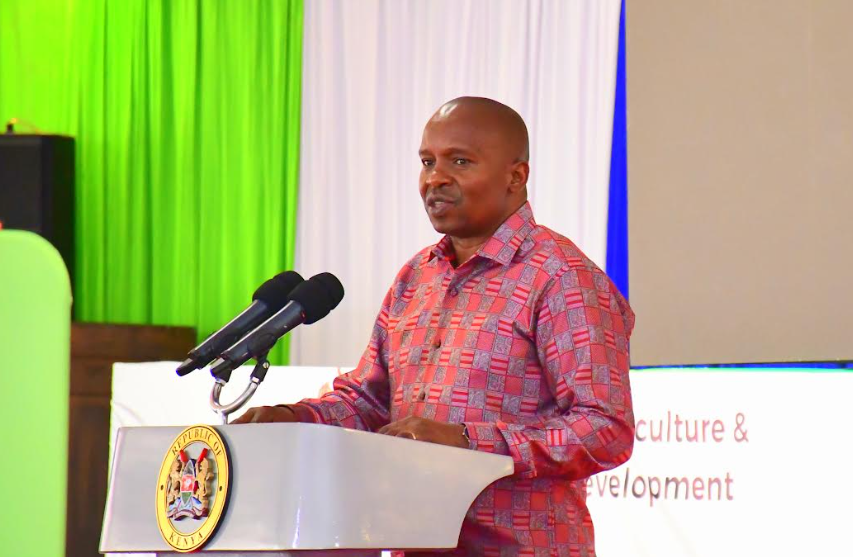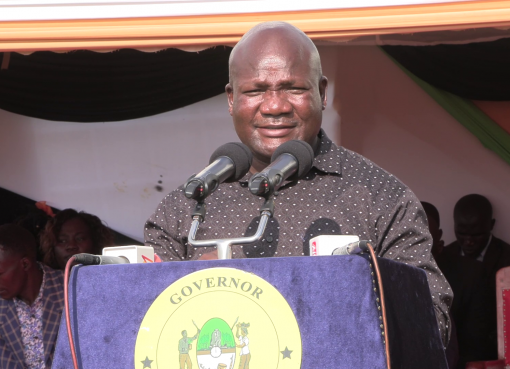The government has allocated Sh 2 billion for the distribution of 97,000 metric tonnes of subsidised fertiliser to tea farmers to enhance their agricultural productivity and reduce the burden on farmers while ensuring steady access to essential inputs required to improve tea harvests and quality.
Speaking at Sarova Whitesands during the Tea Industry Centenary Summit as the Tea Board of Kenya celebrates 100 years of tea commercialisation in Kenya, the Deputy President, Kithure Kindiki, highlighted that in the last two years, the Government has made available over 180,000 metric tonnes of subsidised fertiliser accessible to farmers for 2,500 per 50 kg bag.
Addressing other challenges facing the Tea Sector, he noted that the government has seen remarkable progress in the resolution of the governance challenges at the Kenya Tea Development Agency (KTDA) by holding the recent elections, which ushered in fresh new leadership.
He highlighted that legal and institutional reforms are ongoing to enhance the tea sector’s performance and that they will ensure strict enforcement to safeguard the interests of the farmers.
Kindiki added that amendments to the Tea Act 2020 are ongoing, while some of the Tea regulations required to operationalise the Act are being developed.
“To safeguard the heritage and reputation of Kenyan Tea and the sector and to ensure sustainability, the government has continued to address the challenges facing the Tea value chain, key among them being the high cost of production and processing, market access, lack of value addition, Tea quality and perennial governance,” Kindiki said.
He noted that the Agriculture Pillar in the Kenya Kwanza Government Plan is anchored on subsidising the production rather than the consumption of Tea. He added that this broad target is to ensure to improve agricultural production, guarantee food security, create jobs, and increase Kenya’s exports.
The DP noted that Kenyan Tea is ranked top globally due to its quality, bold flavour, and consistency and generates close to 200 billion in foreign exchange earnings annually, which accounts for 2 per cent of the country’s GDP. It comes third after Diaspora remittances and Tourism.
“The Kenyan Tea is a key anchor of our Country’s sustainability and environmental conservation; it has also supported the education sector and the rural economy as a major source of income and employment,” Kindiki said.
Professor Kindiki acknowledged the role played by women in the Tea Industry, noting that they account for over 60 percent of Global Tea Production, substantially contributing to its sustainability, productivity, and community development, especially because Tea is labour-intensive.
“Tea cultivation also promotes sustainable farming practices and environmental conservation, helping to mitigate climate change because one of the threats our Tea sector is facing is climate change, disrupting weather patterns and introducing harsh and radically different weather conditions that end up affecting the quality of the Tea,” he said.
He added that 600 million kilograms of Tea are produced in Kenya every year, as he pledged to further enhance it through strategic policy administrative interventions, including the constant provision of subsidised fertiliser to ensure that all stakeholders, particularly the farmers, receive value from their hard work.
The Agriculture Cabinet Secretary, Andrew Karanja, reiterated that the government, through the Bottom-Up Economic Transformation Agenda, has prioritised Tea as one of the priority value chains.
He emphasised the need to continue addressing the critical challenges facing the tea industry to ensure its sustainability and competitiveness. Among these is the importance of adding value to tea products, which would enhance their appeal in the global market and generate higher returns for producers.
Additionally, the CS underscored the necessity of improving tea quality to meet and exceed international standards.
“Enhanced quality not only boosts consumer confidence but also secures a strong foothold in the increasingly competitive global market. By tackling these issues comprehensively, the tea industry can unlock its full potential and maintain its relevance on the world stage,” he noted.
He commended the Deputy President for his unwavering commitment to the country’s development agenda, noting the challenges at hand and his dedication to helping the Tea Sector seek efficient and long-term solutions.
By Fatma Said




